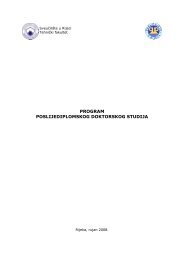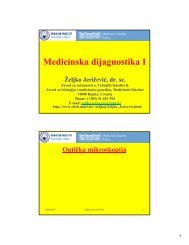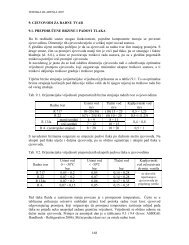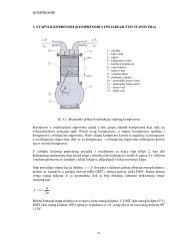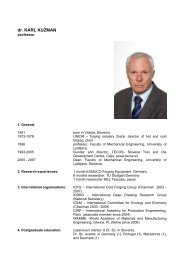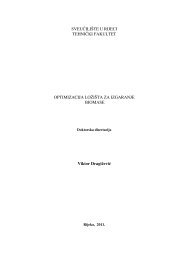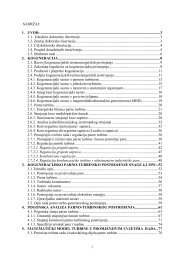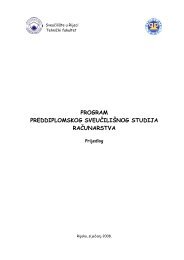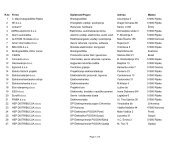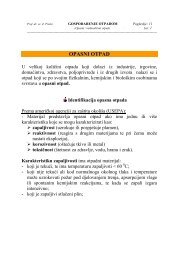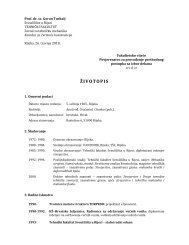universityâenterprise cooperation
universityâenterprise cooperation
universityâenterprise cooperation
Create successful ePaper yourself
Turn your PDF publications into a flip-book with our unique Google optimized e-Paper software.
enefits, that are examples of work between<br />
the higher education and enterprises.<br />
Development of entrepreneurial, management<br />
and innovation skills should become an<br />
integral part of graduate education, research<br />
training and Life-long learning strategies for<br />
university and their employees.<br />
To support universities to make these<br />
organizational changes the Commission has<br />
adopted a Recommendation on the management<br />
of intellectual property in knowledge transfer<br />
activities and a Code of Practice for universities<br />
and other public research organisations.<br />
A good example of this is the European<br />
Institute of Technology - how the EU can<br />
implement innovative governance models –<br />
for the purpose of the modernization agenda<br />
for universities. The final goals are to inspire<br />
change and processes of knowledge transfer<br />
in existing institutions, and to increase<br />
their links with industry.<br />
In order to stimulate knowledge generation<br />
and ensure efficient transfer of its benefits to<br />
the manufacturing sector, a new value-adding<br />
approach to innovation must be nurtured in<br />
which the mutual benefit of collaboration<br />
between the academic and industrial<br />
communities is clearly recognised. The actors<br />
in this process are: Universities, where basic<br />
scientific and technical training takes place;<br />
Research centres, in which graduate and<br />
postgraduate students can build experience<br />
in dealing with the real problems; Knowledge<br />
– intensive SMEs which can transform the<br />
knowledge produced by applied research into<br />
products and services; and Manufacturing<br />
enterprises, equipped to incorporate the<br />
acquired knowledge into products and<br />
processes with the qualities needed to<br />
support enhanced competitiveness.<br />
“The Knowledge triangle of research, education<br />
and innovation to function within favourable<br />
framework conditions, which reward the<br />
knowledge that input to work. In Europe, we<br />
need to become much better at producing<br />
knowledge through research, at diffusing knowledge<br />
through education and at using and applying<br />
knowledge through innovation“ [65].<br />
3.3.2.4. To encourage the Mobility: across<br />
borders and between business and academia<br />
A very important and fundamental point is to<br />
simplify legal and administrative procedures for<br />
the entry of non-EU students and researchers.<br />
A encourage of this effort in 2005 the European<br />
Community was adopted the “researchers’<br />
visa” package. This kind of directive and<br />
recommendation on the admission of thirdcountry<br />
nationals to carry out scientific research<br />
was transposed into national law in 2007.<br />
The second important issue is work on an<br />
attractive image for European universities<br />
in the world.<br />
Also, an integral part of learning programmes<br />
in all disciplines should become followings:<br />
Internships, research mobility programmes<br />
and collaborative project, which allow<br />
students to work with or within a company.<br />
A major effort should be made to achieve<br />
the core Bologna reforms by 2010 in all EU<br />
countries: modernized curricula at all levels<br />
which correspond to the needs of the labour<br />
market; and trustworthy quality assurance<br />
systems and comparable qualifications<br />
(short cycle, Bachelor, Master, Doctorate).<br />
It is important to:<br />
• Promote the value of mobility and to be<br />
recognised by university and business;<br />
in particular SMEs should participate<br />
more in internships;<br />
• Adapt the Legal frameworks for the<br />
purpose of support mobility between<br />
university and business;<br />
• Recognize and accredit the needs for<br />
mobility of academics, researchers or<br />
students to business.<br />
By European Forum on <strong>cooperation</strong><br />
between Higher Education and the Business<br />
Community, Mobility is giving following<br />
opportunities:<br />
• Transfer of knowledge of the needs of<br />
industry to HEIs;<br />
• Transfer of knowledge of how HEIs<br />
function to industry;<br />
• Giving graduates’ first hand experience<br />
of the labour market;<br />
29<br />
State of the art in the area of university-enterprise <strong>cooperation</strong> - EU level 3



